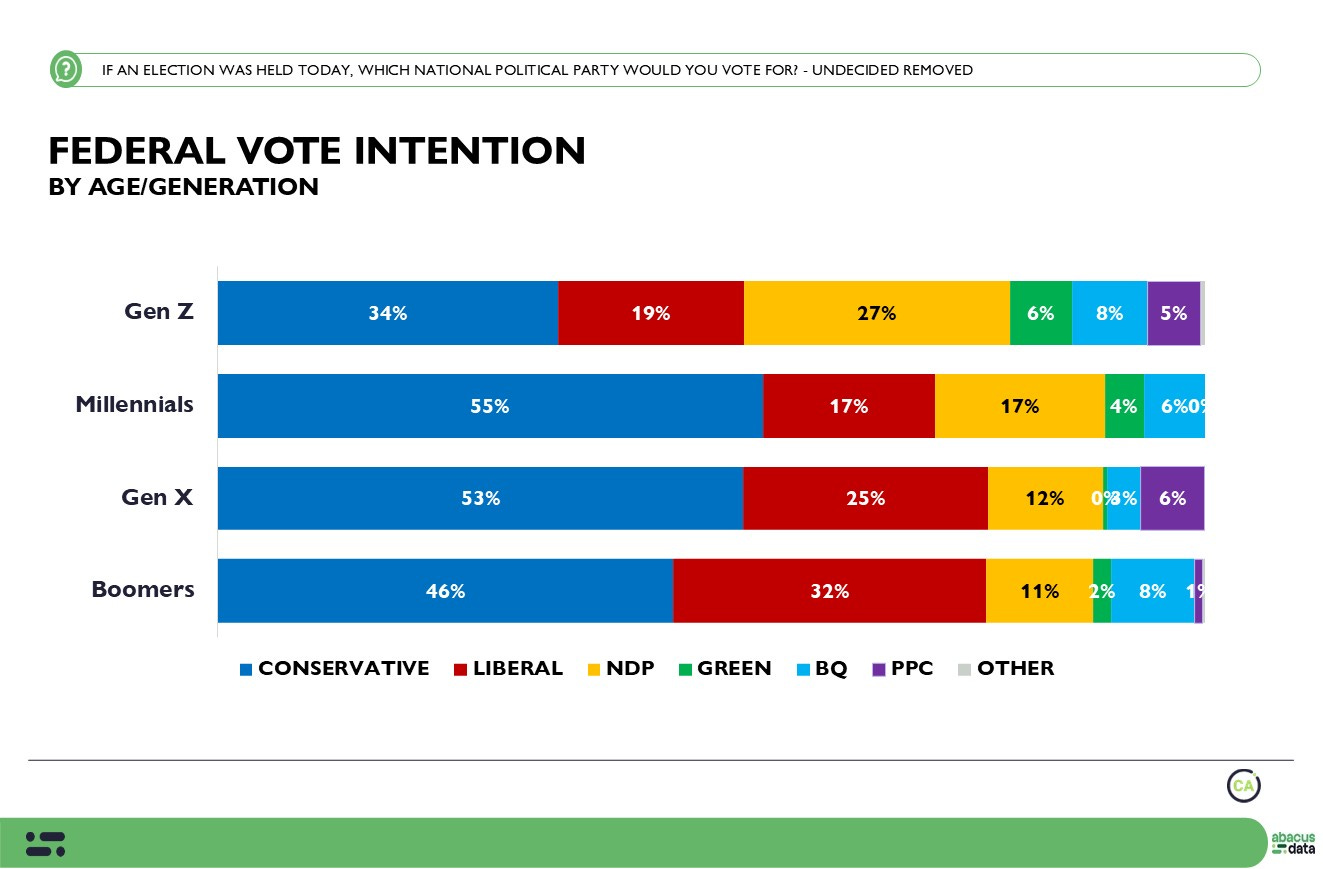If you’ve been watching Canadian politics over the last few weeks, you might think the defining generational split is all about Millennials and Gen Z at the forefront of change. But dig into the data—and the current political climate—and it quickly becomes clear that it’s the Baby Boomers (60 years old and up) who are driving the latest shifts in opinion and attitudes across the country. From tariff anxieties to federal vote intention, this cohort may be the one to watch.
Why the sudden focus on Boomers? First, let’s talk about voting intention. In our latest national Abacus Data survey, the 60+ crowd is the most likely to vote Liberal, with 32% expressing support—nearly twice the rate among younger Canadians.
At first glance, you’d assume Boomers might be leaning Conservative, and it’s true that the Tories still lead among older Canadians overall. But that 32% Liberal share is critical—especially when you compare it to Gen Z or Millennials, where Liberal support often dips below 20% (which I’ve written extensively about). In a country where elections often hinge on turnout, a big share of the Boomer vote can be a game-changer. These folks vote in large numbers, and they tend to stick with their choices.
Next, consider the looming presence of Donald Trump. The former U.S. President has been openly musing about slapping a blanket tariff on Canadian goods and even dropping hints (or threats) about Canada becoming the 51st state. For younger Canadians, this might be just more noise from Trump. But for Boomers, Trump isn’t just an annoying sideshow—he’s front and centre on their TV sets every day inflaming their anxieties. More than half of respondents aged 60+ say they’re following Trump’s tariff threat “very closely,” the highest of any group. And when asked about the top three issues facing Canada, 59% of Boomers cite “Donald Trump and his administration” as a major concern—a level far above that of younger cohorts.
It doesn’t stop there. Boomers are by far the most likely to say they’ll boycott American products if Trump follows through on his plans. A striking 54% of those over 60 told us they would “absolutely do everything” they could to avoid buying goods from the U.S. or from American companies, compared to only 31% of 18- to 29-year-olds. That’s a significant consumer backlash aimed squarely at the American market—and it could have real economic implications if that sentiment sticks.
What does this mean politically? For one, the Liberals, now in a leadership race following Justin Trudeau’s resignation, may owe their next victory (if they manage to pull one off) to this older cohort rather than the youth vote. Remember, the Liberals’ 2015 majority was largely credited to a surge in youth turnout, drawn by Trudeau’s promise of fresh ideas and a different political style. Now, with Trudeau stepping aside and the possibility of Mark Carney—born in 1965 when most say the Gen X generation begins—entering the fray, a very different dynamic is emerging. Carney, who is turning 60 soon after the Liberals elect their new leader is on the cusp of the Boomer demographic. Should he become the Liberal leader, he’d be the one best positioned to connect with older voters who see Trump as a genuine threat, are deeply concerned about Canadian sovereignty, and remain open to a party that can “stand up to Trump.”
Meanwhile, the opposition leaders—Jagmeet Singh (NDP) and Pierre Poilievre (Conservative)—are younger, just Gen X but more Millennial than any other leader we’ve seen. They speak a political language that often resonates with younger or more change-focused voters. But given Boomers’ heightened sense of caution and their readiness to take immediate action against a perceived threat, makes them politically interesting to me. The Conservative camp, in particular, has been riding high on anti-Trudeau sentiment for months. With Trudeau no longer in the picture, that unifying focus has evaporated, and the data suggests Boomers might be less keen to make a radical shift if they feel comfortable with a Carney-led Liberal team.
There’s a powerful irony here. The party that rode to power in 2015 on the backs of enthusiastic young voters may now be propped up by a generation that’s more commonly associated with a slight conservative bent or at least a preference for stability over change. But as every political operative will tell you, a dependable voting bloc is worth its weight in gold. And the Boomers? They’re a massive segment of the population, they have considerable wealth, they’ve got plenty of time to follow the news, and they show up to vote—in big numbers.
The lesson? Never underestimate the power of the Boomer generation. We’ve done so at various points in their life cycle, only to be surprised (sometimes unpleasantly) by their sheer size and influence. As they gather around the Liberal banner in growing numbers—motivated by Trump’s latest threats and a desire for a steady hand at the helm - I’d watch carefully what they decide to do.





